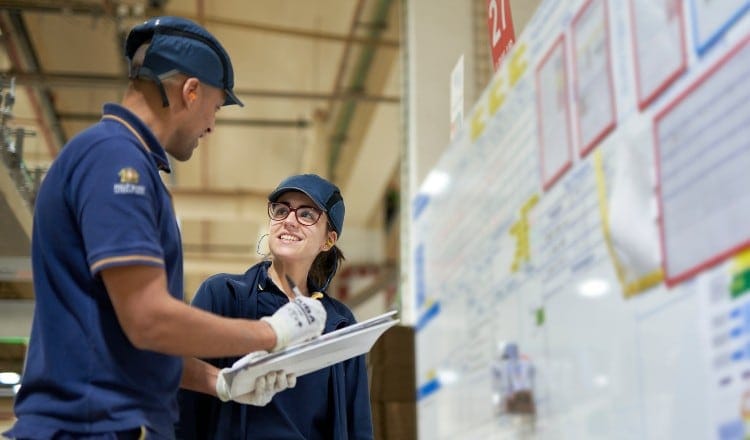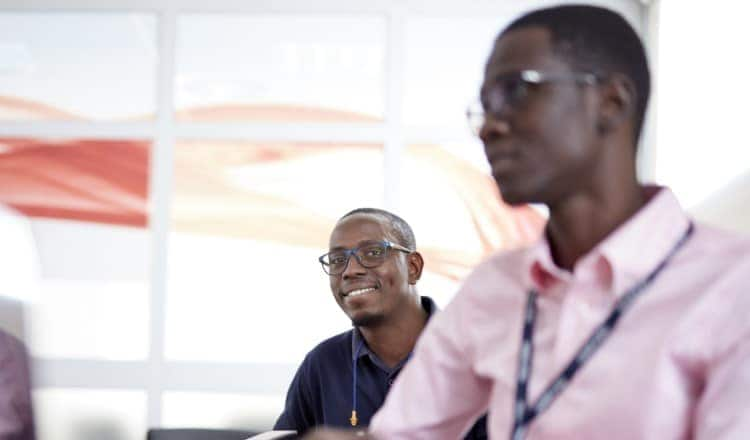| INTEGRATED REPORT 2019 |
Attracting, retaining, and developing employees is increasingly important in a time of demographic shifts, disruptions in the world of work, and business transformation. We are providing employees with opportunities to learn, grow, and contribute to great results while at the same time adapting to employees’ changing expectations of their employers.
Why it is important to us and our stakeholders
Effective talent attraction, development, and retention help maintain the employability of employees by ensuring they can pursue professional opportunities and contribute meaningfully to society. This has positive effects on engagement, satisfaction, and well-being.
Our business success over the long term relies on our ability to recruit and retain talented people. Their commitment and engagement are vital in every function of our business. The dedication, talent, openness, and passion of our employees enable and accelerate our company’s transition into a more consumer-centric organization increasingly focused on science and innovation. Investing in our people is therefore fundamental to our success now and in the future.
Achieving our aims
Our ambition is to attract the right people to our company and to encourage our employees to develop their careers with us. We aim to provide an environment of lifetime learning where talent can grow inside PMI, and which maintains our workforce’s high employability.
Our aim:
+30
We aim to achieve a global employee net promoter score of +30 by 2025
PMI’s vision of a smoke-free future helps to attract and retain talent. The opportunity to contribute to this purpose and such a massive business transformation is compelling to many, as is the chance to make a positive societal impact. The way we manage attraction, retention and employability is supported by our policies and programs in workforce inclusion and diversity, in addition to our fair working conditions, and contributes to a workplace culture that has at its core an emphasis on respect for the individual and continual learning and development.
Initiatives such as our Thrive leadership program and our global online learning platform (known as FUSE) enable our people to develop their capabilities and skills in an easy-to-access way. Our Workplace Integrity policy, along with other internal policies, helps us to manage career progression, lifelong learning and rewards and to ensure equal opportunities are provided to all our employees.
In 2019, to better understand how employees feel about our transformation journey and to make sure we are all as invested as possible in its success, we conducted a global Transformation survey, helping us evaluate employee engagement across our company overall. It was the first time such a survey was conducted and enabled us to set a baseline and employee engagement target. Our target for 2025 is to achieve an employee net promoter score of +30 (within a range of -100 to +100).

Progress in 2019
Attracting talent
Our business transformation has led us to identify and seek to close critical skills gaps. To achieve this, we have professionalized our talent acquisition function and deployed new methods of talent attraction by investing in people, systems, tools, and processes. Our transformation journey resulted in higher turnover in 2019. This – combined with our business strategy to close our skills gap, a number of planned restructurings, and closure of some of our factories – contributed to the increase observed. But we also recorded some high employee engagement (net promoter) scores, particularly among new hires. These opposing signals and the uniqueness of our changing business model are triggering new ways for us to adapt.
The way we recruit talent is evolving. During 2019, we modernized and streamlined our recruitment processes, and revamped our employer brand to better showcase the values and opportunities we offer. As we accelerate our transformation away from cigarettes, we want the PMI employee experience to be even more compelling, and so we developed and managed the PMI global digital channel portfolio to improve the employee/candidate experience journey. We are also building a pipeline of PMI talent by investing in early career programs.
Achieving high retention starts with effective onboarding processes for new employees. We are investing in new technology, launching a line manager and buddy program, and redesigning our global induction to enhance and drive consistency of the experience. A number of our markets have successfully piloted a PMI portal for new hires that is being rolled out globally this year.
Rewarding employees
Our Total Reward mission is to co-create and enable a high-performance culture that drives PMI to achieve its vision. We do this by offering employee-centric, inclusive, and sustainable reward programs, which champion the well-being and development of our people. The approach of Total Rewards at PMI is to recognize people as individuals, each with different motivations, values, skills, experience, and aspirations, knowing also that these can change over time. These differences are heard by PMI, and what we hear and learn helps shape our reward offerings at PMI. Across PMI’s markets, the offerings are locally relevant and include some global elements such as an Employee Assistance Program for all employees. There are many other elements to the package across the world, and these differ from market to market – depending on local agreements and preferences – and often include a variety of bonus plans, life insurance and long-term sickness plans, retirement-related arrangements, and paid leave programs. We are reviewing our offerings to ensure they are relevant and appropriate; we recognize some aspects remain constant and others change as the workforce changes and as their needs change, so we are focused on putting the employee in the center more and more going forward.
Employee development – an evolving culture of learning
In 2019, we further enhanced our approach to onboard new hires into PMI and track the success of this approach on a quarterly basis. Further, we seek to ensure employees are provided with opportunities to continuously develop and to grow within the organization. Our Global Learning approach aims to open up learning processes that are responsive to what employees need, when they need it. This simplification and responsiveness of the learning process is the signature of our new learning culture. Our ultimate aim is to create a skilled and confident workforce by giving our people the tools they need to perform to their best ability within their current roles – and to develop their potential to be successful in future roles.
To help instill such a culture, our “Culture of Learning” campaign in 2019 showcased how employees can take ownership of their own learning and – under the slogan “Connect to the power of learning” – access training tools and resources in an on-demand environment at the point of need. Advances in learning technology allow our people to learn in ways that are more interactive and collaborative. We recognize that a personalized service in isolation falls short, so a key part of all learning is to share it: to connect, discuss, and engage with others at local and global levels.
Since its launch in 2018 and through 2019, we grew the number of repeat users on our global learning platform and drove increasing engagement. Following our 2019 Culture of Learning campaign, more than 44,000 employees (over half the workforce) have started to adopt FUSE as a learning resource. During 2019, the platform delivered content over a million times and enabled more than 12,000 unique users every month to engage with learning resources.
The Global Learning approach constantly seeks colleagues’ input on the barriers to and enablers of a culture of learning at PMI. A key hub of engagement is a Global Learning Network of 850 employees, made up of volunteers representing a broad swath of countries and seniority levels, as well as various other categories of diversity. This network provided 1,322 survey responses in 2019, and its members were involved in numerous focus groups, shaping solutions in the areas of personal-effectiveness skills, change leadership, performance conversations, and foundational knowledge.
A key focus of training efforts in 2019 across our affiliates was enhancing management and leadership skills. Knowing that great managers make all the difference to performance, productivity, and profitability, we have designed our Thrive Leadership Fundamentals program to provide experiential learning in critical managerial foundational skills. In 2019, this program was rolled out in 45 markets and was completed by almost 2,000 employees, from junior to middle managerial levels.
Performance management
PMI uses a global performance management system set up to run as an annual process. At the beginning of the year, employees agree on objectives with their managers. This is followed in November by an appraisal that includes feedback and one-to-one discussions. Each individual receives a performance rating based on their delivery against business objectives and key behaviors deemed critical to PMI’s success. PMI also has a 360-degree feedback tool to complement traditional performance measurement methods.
We have incentive compensation programs to recognize, motivate, and reward performance. Our annual performance-based variable cash awards, for example, motivate eligible employees to meet or exceed our company and individual performance targets in any given fiscal year, focusing contributions on PMI’s objectives, goals, strategies, and KPIs. These include leadership objectives that recognize and value the importance of demonstrating the right behaviors in line with PMI’s values. Likewise, our equity awards are designed to reward achievements versus targets, while minimizing share dilution and protecting against excessive risk taking. These are intended to motivate our executives to produce results that enhance sustainable shareholder value and strengthen PMI over the long term.
Employee engagement
In July 2019, we conducted a global survey among our employees to understand what we were doing well and not so well as an organization as we progress in our business transformation. Over 34,000 employees (close to half our total workforce) responded to the survey, giving us solid data from which to extract insights.
We measured the engagement of our workforce using the employee Net Promoter Score (eNPS) concept, following a methodology similar to that we use to measure consumer engagement. We complemented this with several other questions relating to areas of employee engagement (for example, the perceived support from supervisors) and to the core levers of our transformation agenda (for example, how well we are progressing on our priority to become more consumer-centric in our mindset and ways of working).
The survey showed an overall eNPS score across PMI of +16. eNPS scores are specific to each company’s reality and as such the best way to benchmark these is to measure the trend within the organization over time. However, external averages show that a positive eNPS score of between 0 and 30 is a strong achievement, especially given the level of transformation that we are driving across all parts of our business. People engagement and morale remain a key priority for PMI and we want to continue to set ambitious targets for ourselves in this space. As a result, our target for 2025 is to achieve an employee net promoter score of +30. As of January this year, we have embedded eNPS as part of our leaders’ objectives to ensure there is adequate focus on this critical dimension.
We combined this score with other insights from the survey, while taking into account variances based on such factors as geography, gender, business function, and seniority level. We were encouraged to find a very strong understanding among employees worldwide of PMI’s vision and the rationale for our transformation. This was especially gratifying given that our smoke-free products are not yet commercialized in all markets. At the same time, however, we found that energy levels were lower than expected. Any fundamental change brings with it uncertainty, and that can create anxiety. To address the issue, we aim to improve the way we recognize employees’ hard work and focus on better equipping our people to manage change.
Regarding our transition to a consumer-centric organization, we were pleased that 89 percent of employees felt they clearly understood the consumer needs that are relevant to their jobs. This is particularly important as a clear correlation arose between consumer centricity and levels of employee engagement. Nevertheless, the survey also revealed that the use of consumer insights is not yet fully embedded into decision-making processes. This will be a key focus area for 2020. We intend to leverage some of our existing methodologies to drive the right behaviors in this space.
Another learning related to management, as respondents underscored the importance of supervisors encouraging a culture of learning and two-way feedback. The 2019 Transformation survey will serve as a baseline through which to track employee engagement. We plan to conduct a global survey every year and to complement it with quarterly surveys focused on a subset of questions that have proven to be strongly correlated to engagement levels.
Next steps
In 2020, we plan to improve our onboarding process to make it more consistent across the business and will expand our Global Learning Network and include more feedback from participants. We will also focus on reducing early attrition, i.e., incidents of new recruits leaving within months of joining the company.
In addition, building on the employability pilots started in 2019, we will expand our program to instill skills for the future of work across a larger population of the company.
This online supplement to our integrated report should be read in conjunction with PMI’s Integrated Report 2019. The information and data presented in this online supplement cover the 2019 calendar year or reflect status at December 31, 2019, worldwide, unless otherwise indicated. Where not specified, data come from PMI estimates. See About this online supplement for more information. Aspirational targets and goals do not constitute financial projections, and achievement of future results is subject to risks, uncertainties and inaccurate assumptions, as outlined in our forward-looking and cautionary statements.






